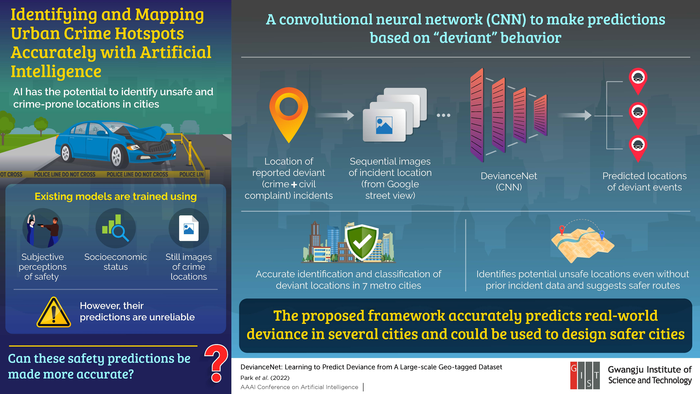In a city, finding likely hotspots of crime is a key concern for urban safety development, and it can aid authorities in taking the required steps to make the city safer for its citizens.

Identifying location-specific attributes is an important aspect of social artificial intelligence. However, models that are frequently trained on subjective perceptions and still images are unreliable in predicting crime. Now, researchers from gist in Korea take things to the next level by training a neural network with a geotagged dataset of reported deviant incidents and sequential images of deviant locations to accurately determine unsafe locations by linking the deviant behavior to the visual features of a city. Image Credit: Gwangju Institute of Science and Technology.
The success of such precautionary measures relies on the precision of the predictions, which are typically made using artificial intelligence (AI)-based models.
Maximum existing models make use of subjective insights of socioeconomic status, safe locations and still images of crime scenes. Also, only a few violent crimes are regarded as input data. Consequently, there is a disagreement between the predictions and reality often.
In a new paper published in AAAI Conference on Artificial Intelligence, scientists from the Gwangju Institute of Science and Technology (GIST) in South Korea suggested a different strategy depending on a large-scale dataset and the concept of “deviance.” The new strategy included both violent crimes and civil complaints regarding behavior that violated social norms, which is also known as “deviant behavior.”
Consequently, the researchers designed a convolutional neural network model, suitably called “DevianceNet,” and trained it with a geotagged dataset of deviant incident reports with corresponding sequential images of the incident locations that were acquired with Google street view.
Our work is the first study that investigates the relationship between the physical appearance of a city and deviance with deep learning techniques.
Dr. Hae-Gon Jeon, Associate Professor, Gwangju Institute of Science and Technology
Dr. Jeon headed this study.
The images from 10 GPS coordinates were collected by researchers, within a radius of 50 m from the location of reported incidents. For every GPS location, they considered images with 12 directions for a sum of 120 images. With data from five main cities in South Korea and two cities in the USA, they trained and verified their model using 2250 deviant places and 760,952 images.
Such a huge dataset improved the prediction abilities of the model to identify possible deviant locations.
This improved visual perception tasks such as recognition, classification, and localization. The holistic representation of DevianceNet extracted from entire image sequences makes it possible to accurately classify and detect deviant places.
Dr. Hae-Gon Jeon, Associate Professor, Gwangju Institute of Science and Technology
As the model can detect irregular behavior from the visual characteristics of the environment, it is not just specific to cities and can be employed to detect potentially risky locations even when data for criminal incidents is not available.
This makes it a useful tool in countries that have poor record keeping. The model can also be integrated into navigational services to suggest safer routes. Additionally, city planners can use the results of the prediction to understand how the city’s layout or design environment can be redesigned to lower instances of deviant behavior and criminal activity.
Dr. Hae-Gon Jeon, Associate Professor, Gwangju Institute of Science and Technology
There is a hope that his visions will be realized soon.
Journal Reference:
Park, J-H., et al. (2022) DevianceNet: Learning to Predict Deviance from A Large-scale Geo-tagged Dataset. AAAI Conference on Artificial Intelligence. https://aaai-2022.virtualchair.net/poster_aisi253.